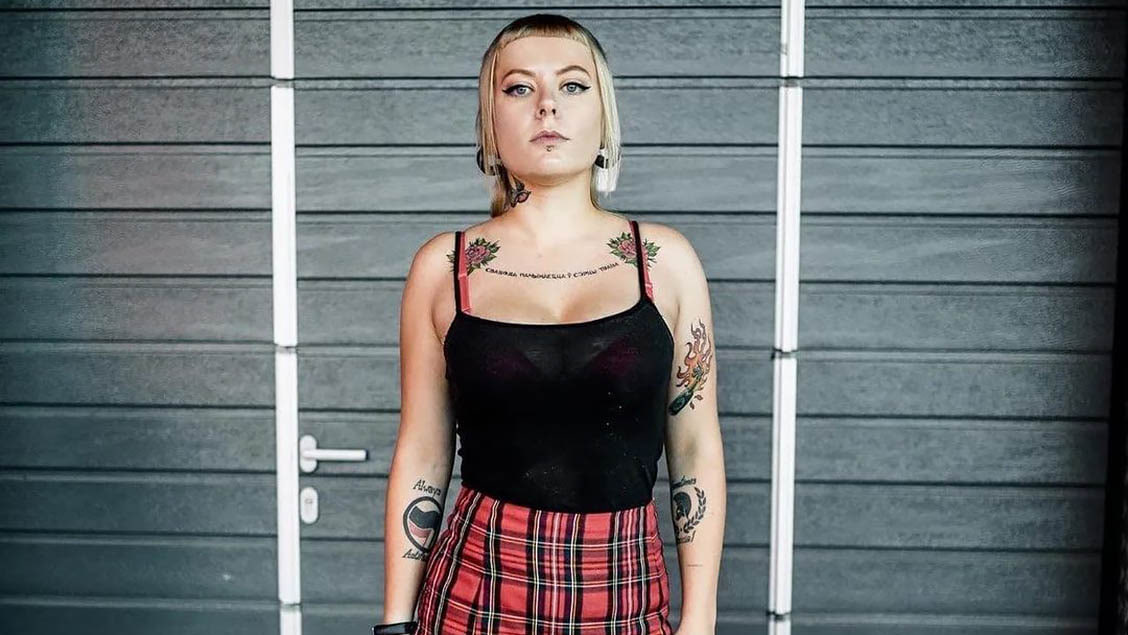Antifascist from Mozyr Kristina Cherenkova was detained on March 23, 2022 together with her husband. Later the girl was accused of inciting social hatred for unflattering remarks in her personal Instagram account on Belarusian cops and sentenced to 2.5 years in prison. Having served her sentence Christina was released on April 11, 2024. We talked to her about the detention, the trial and the actual conditions in the women’s prison colony.
“I had a feeling it was going to happen. And it happened.”
On March 23, 2022, around 7 a.m., Kristina, along with her husband Fedor, woke up to the loud noises and sounds of a bolt cutter. A couple seconds later, the entire apartment was filled with people in black.
“I didn’t even have time to wake up fully, to come to my senses, when I felt blows on my legs and back. I did not offer any resistance, but it did not prevent them from using force on me,” Kristina recalls.
Upon detention, the girl had a lot of bruises. Later there was an investigation on the fact of unlawful use of physical force and means of restraint by police officers during detention, but it did not lead to any result. Several months later, Cherenkova received a letter saying that the investigators couldn’t find out how she got injuries.
“In their opinion, as stated in the ruling, I most likely inflicted them on myself in the process of detention”.
Kristina recalls:
“Before the criminal proceedings, I was indeed detained on administrative charges, and also the staff of the police department of Mozyr city in 2021 conducted a check of all my social networks, but nothing caused questions at that time.
Of course, I realized that I should be quieter, especially given the increased interest in my page of all sorts of crazy supporters of Lukashenko. By the way, one of them wrote a denunciation about me to the cops in 2021. But how was it possible to keep quiet when you see this lawlessness every day? When you see that people go to jail because of some far-fetched nonsense… And when the war started, it became absolutely impossible to keep silent”.
The antifascist notes that despite the fact that she was always very careful in her publications, never insulted anyone by name, never called for aggressive and violent actions, she had a feeling that sooner or later they would come for her.
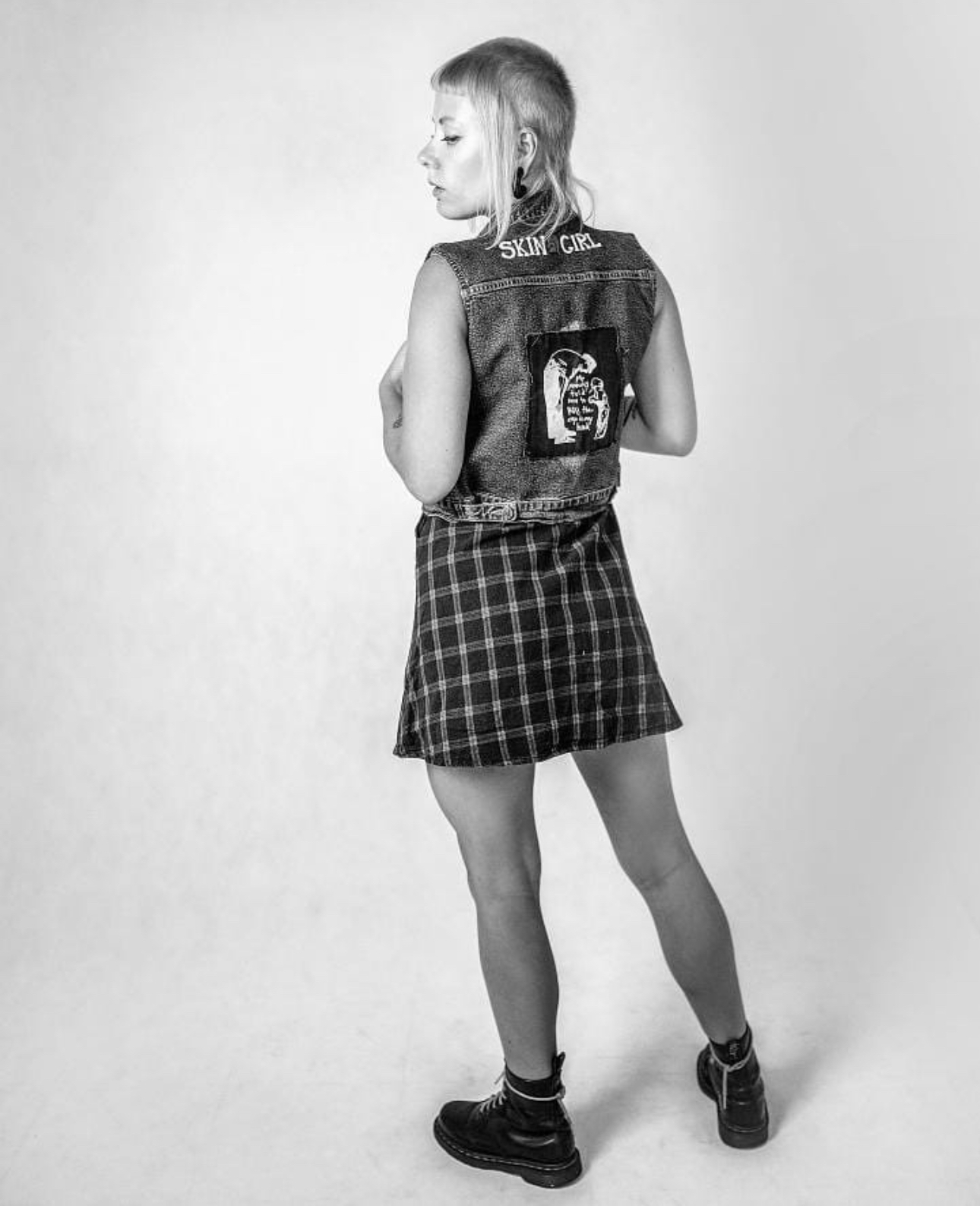
“I didn’t know when it would happen, what article I would be charged with, but I felt that it would happen.
And it happened… To be honest, initially I didn’t even realize who they came to see – me or my husband. When I found out that all this special ops group had come from Minsk and Gomel because of a few comments on the Internet, my first thought was: “Damn it, how much tax money is spent in our country on imitation of this vigorous activity?”
That day 10 people from Kristina’s close circle were detained, most of them were brought to administrative responsibility. Only Kristina Cherenkova and her friend Anna Pyshnik* were charged under criminal articles.
“A couple hours after the detention after all the searches I was brought to the police station. I had a multi-hour interrogation by an officer of the State Department of Internal Affairs. From him I learned almost immediately that I was detained on suspicion of committing a crime under Article 130, Part 1 of the Criminal Code.” (Intentional acts aimed at inciting racial, national, religious or other social enmity or discord on the grounds of racial, national, religious, linguistic or other social affiliation)
“When the investigator closed the case, she said that she did not see the proclaimed offence at all”
The trial of Kristina Cherenkova started after almost 8 months of detention and lasted three days. The girl refused to testify in court, so in the process they read out her testimony from the interrogations.
“It was not a trial, but some absurd theater. A journalist who broke through to one of the court sessions later told my relatives: “I might be stupid but I still don’t know what she’s accused of.”
The charges include posts on Instagram, containing the following expressions:
“Congratulations to the Belarusian policemen on their fail”, “It’s a well-known fact – cops are worse than garbage”, “A good cop is a dead cop”, “Stupid piece of brainless biomass in a balaclava” and others.
For this, Kristina was found guilty of inciting social hatred against policemen and received a sentence of two and a half years.
“In general, I still expected a maximum of two years, as all the numerous inquiries, which were conducted for so many months, could not find anything. They only revealed a negative assessment of the activities of police officers, expressed by the words “trash”, etc. This was enough for the prosecutor to request 3 years of imprisonment, and the judge ended up giving me 2.5 years in prison colony.
It’s funny that when the investigator was closing the case, she said that she didn’t see any reasons for Article 130, but she was instructed to close the case with this article”.
“You don’t actually belong to yourself”
In February 2023, the Supreme Court considered Kristina Cherenkova’s appeal against the verdict, but left it without changes. After that the antifascist was transferred to the women’s prison colony No. 4.
According to Kristina, the worst thing about imprisonment, especially in the colony, is the feeling of the absolute helplessness.
“You actually do not belong to yourself… And also, as a person who values her time, it was simply unbearable for me to spend daily precious minutes and hours on some useless activities, endless marches, going from the factory and to the factory, endless queues in the wardroom.
And, of course, sometimes it was very hard to hold back and not say everything you thought about them to the prison guards’ faces.”
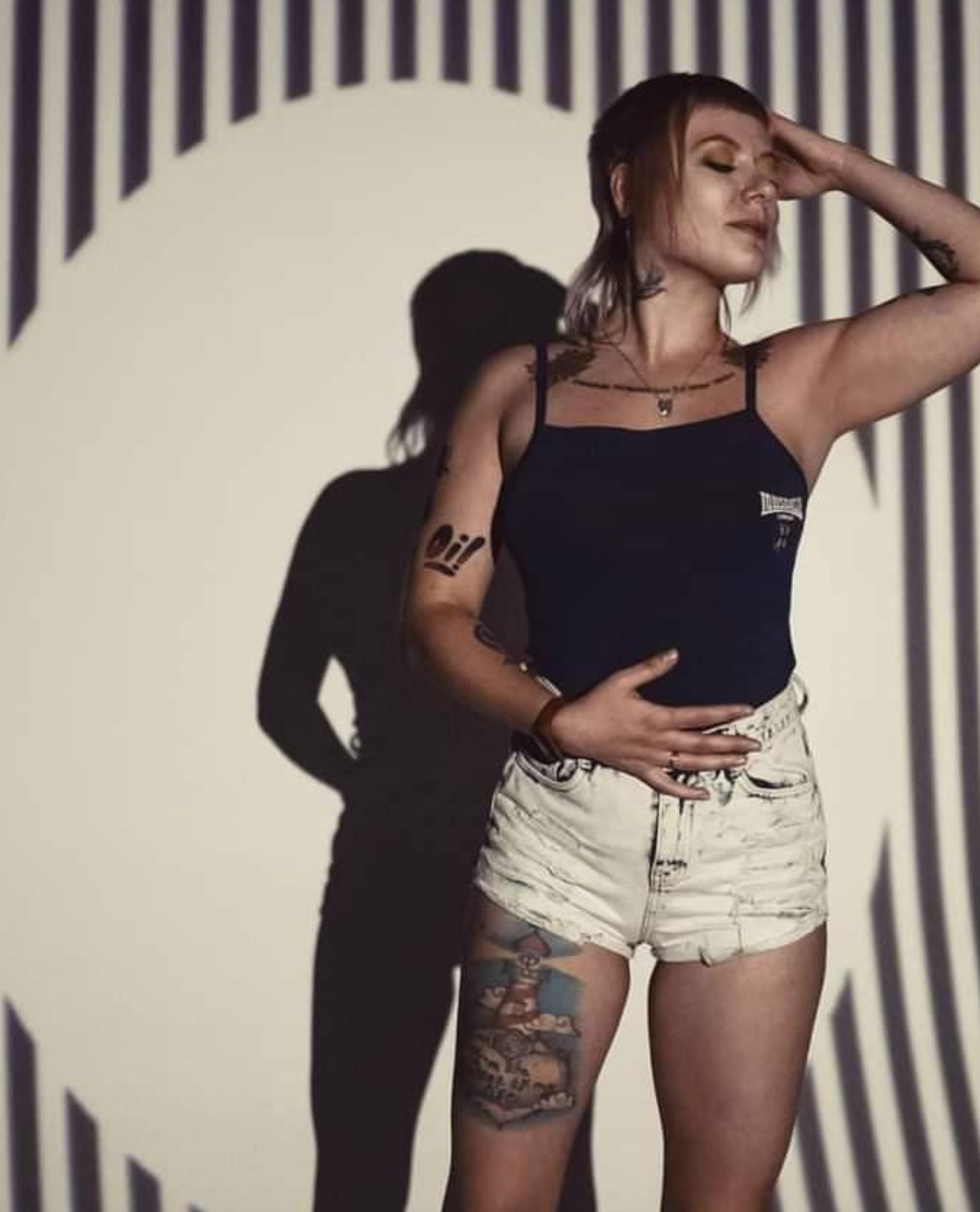
Kristina notes that life in prison is organized in such a way that political prisoners do not have a minute of free time. If work falls on the first shift, after rising at 6 a.m. you literally have only 20 minutes to make the bed, wash up, and dress.
“Then you go to breakfast, and after that, you’re marched to the factory. From the prison quarters to the factory is about 100-150 meters, but this way lasts on average half an hour. The work shift lasts until 14.30, but you get to the quaters at about 15.10-15.15, because you stand for a long time, and then you go through inspections and “gvozdika” [a frame with a metal detector].
If there is no activity for you immediately after coming from work, like a lecture in a club, you have half an hour to have a cup of coffee before the inspection. At 4 p.m., the counting and name-check begins. Immediately after it begins “vektora” – this is when you have to sit in the educational work room for several hours under the camera and watch TV. Then we have dinner, an additional check for profiling, and then it’s time to get ready for bed.”
Kristina says that between all these activities prisoners have moments of free time, but “if you have to clean snow, scoop puddles, go to inventory work, etc., you can forget about free time.” If you work the second shift, the day looks almost the same, only broken up differently.
“The life of the political prisoner differs significantly from the life of ‘decent prisoners’: what is allowed to a mere mortal is categorically forbidden to a political prisoner. Even the smallest little thing can lead to punishment.
And in terms of everyday life we have special conditions: upper sleeping places on the very aisle, the most uncomfortable and hard-to-reach places in the wardroom, calls to the relatives only one by one and under the supervision of operatives, while everyone else comes in crowds, long visits for a maximum of one day and without taking out food that is brought by relatives, a ban on attending entertainment events in the club and gym, a ban on raznaryadki [additional working hours – note] in the factory and other restrictions.”
“I’m waiting for all of you, my dears! Together – we are a huge force!”
Because of her anti-fascist views, Kristina sometimes felt prejudice from the prison staff.
“I was forced to paint over two of my tattoos, and one of them was an anti-fascist flag. I was told that this image has already been included in the list of extremist symbols of the Republic of Belarus.
But I would never do that. And besides, I realized that they were just trying to intimidate me.”
In the colony, Kristina was practically never sick, but if necessary, “after standing in line for a couple of hours”, she could get a handful of pills. At the same time, she is absolutely sure that doctors are much less willing to give sick leave to those convicted on political articles than to ordinary prisoners.
In captivity, the anti-fascist lacked good music. At the same time, Kristina drew a lot in the detention center, and her drawings were sent in letters to her relatives.
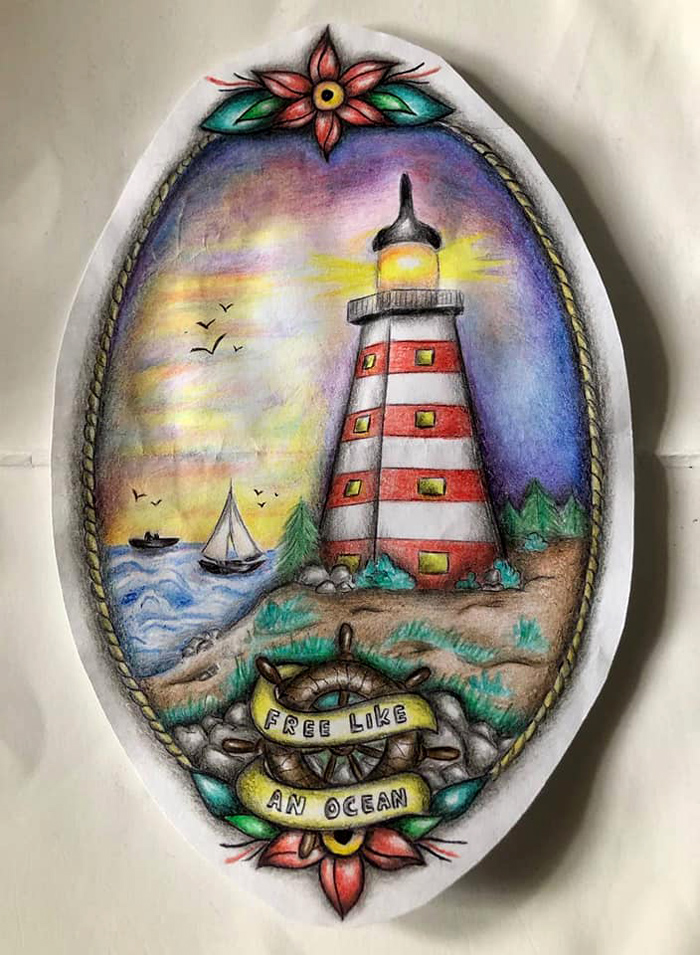
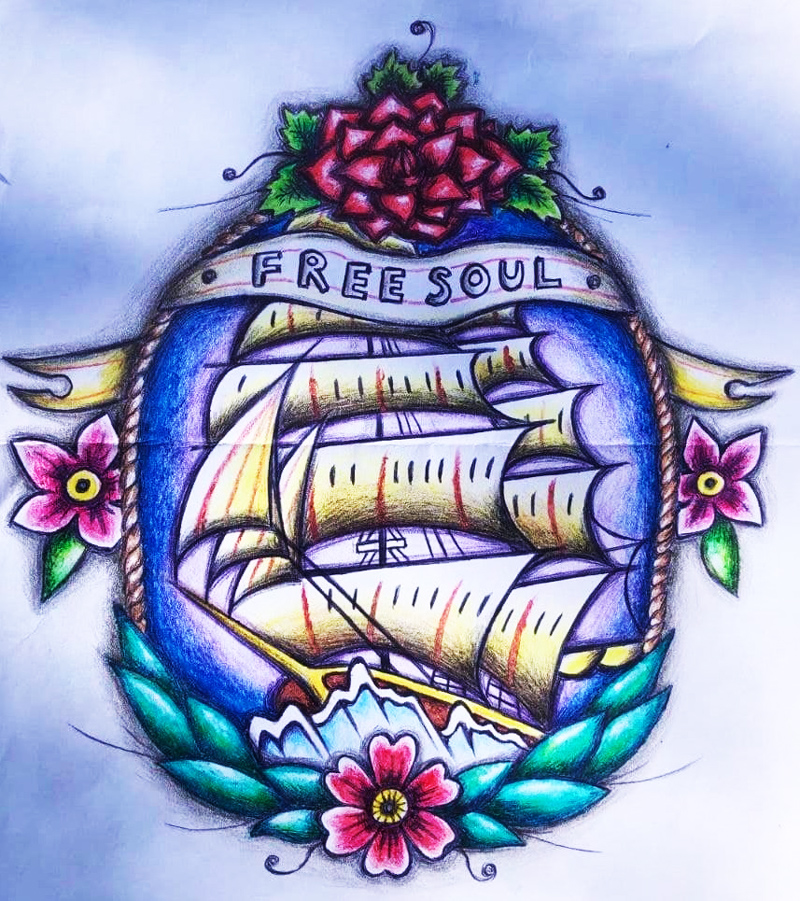
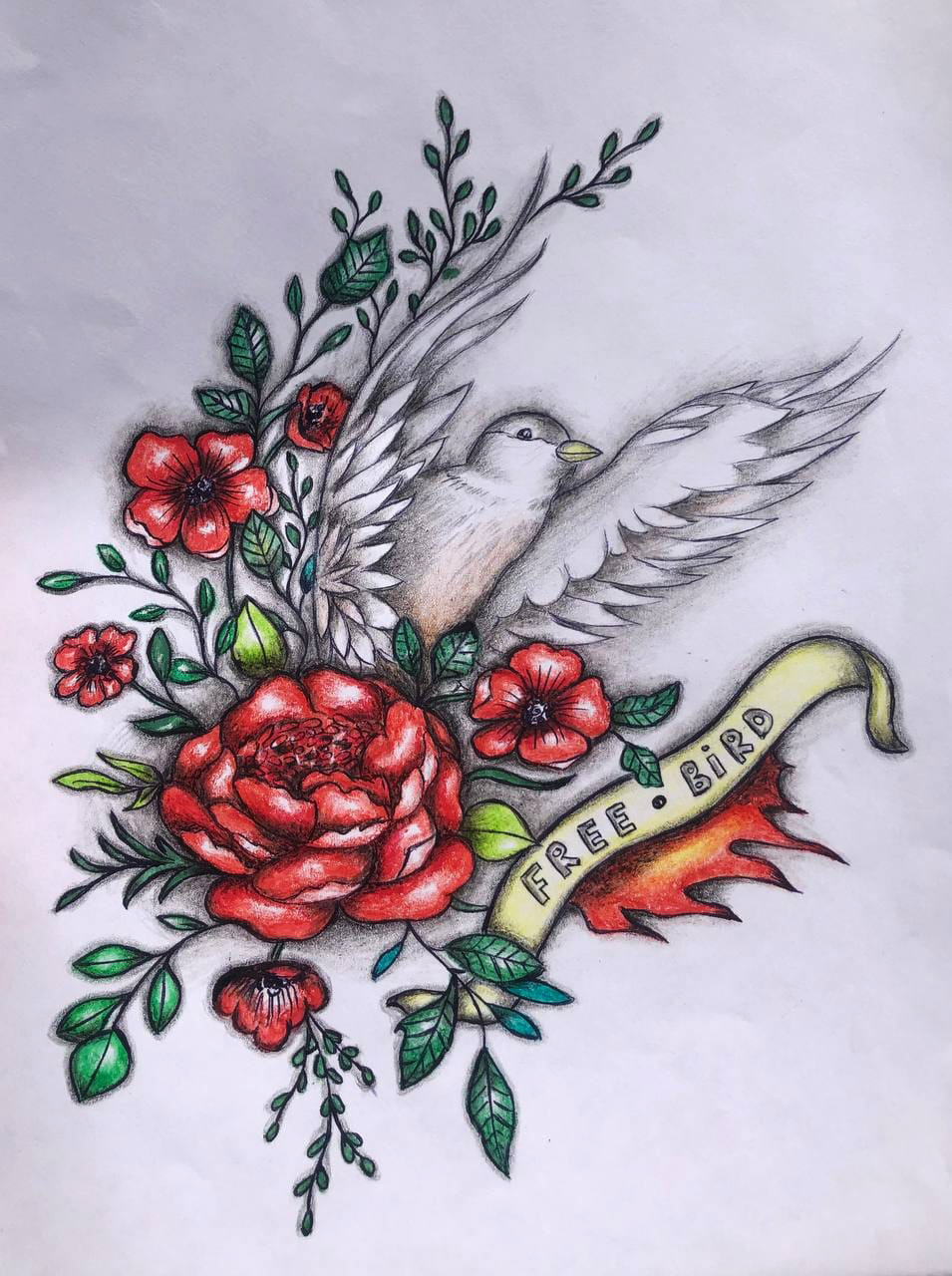
“I used to spend a lot of time creating. I liked it very much… But unfortunately, there is no time for it in the colony. Although for some time I drew for the squad’s editorial board. For example, my Mother’s Day card won first place in the colony, but my surname did not appear anywhere. Political prisoners are not allowed to be on the paper’s editorial board officially, but many draw “undercover”.
The girl says that in the colony she felt support from other political prisoners.
“I was very supported by the girls in the colony. Despite the fact that the administration is constantly trying to eradicate any solidarity and mutual aid among prisoners (especially political ones), we were still one small family.
Kristina’s relatives also made sure to regularly send her greetings from friends and associates and tell her about the huge number of people supporting her.
“Of course it gave me strength.”
Christina notes that letters not from her relatives practically did not reach her. But back in the pretrial detention center the girl received a lot of nice parcels:
“This attention supported me a lot!
There is very strict censorship in the colony, and, unfortunately, letters can’t get through. But still, it’s great that people are still trying to support political prisoners by writing letters and providing other support. At least the prison administration and censors see that people are still remembered and loved.
To all those who still remain in captivity, I wish them not to lose hope and fortitude! Sometimes it seems that despair overtakes you and you can’t see any light, but it is not true ❤️
I am waiting for all of you, my dears! Together we are a huge forth!”
Support Kristina with a donation:
PL59 1020 4900 0000 8602 3669 8310
Krystsina Charankova
РКО
PAYPAL: A.CHARANKOVA@gmail.com
Fedar Charankou
LT553250020307376461
Revolut Bank UAB
